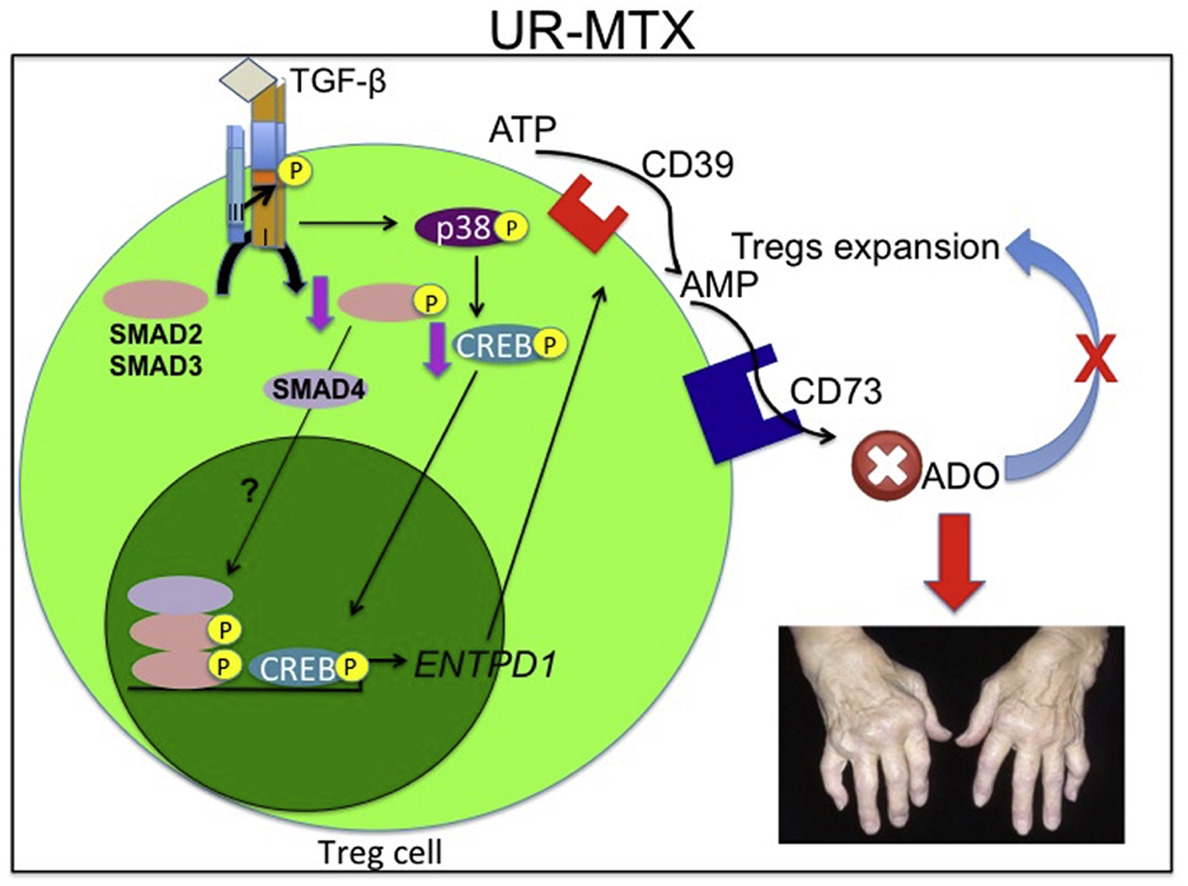TGF-β signalling defect is linked to low CD39 expression on regulatory T cells and methotrexate resistance in rheumatoid arthritis.
Rheumatoid arthritis (RA) is an autoimmune arthropathy characterized by chronic articular inflammation. Methotrexate (MTX) remains the first-line therapy for RA and its anti-inflammatory effect is associated with the maintenance of high levels of extracellular adenosine (ADO). Nonetheless, up to 40% of RA patients are resistant to MTX treatment and this is linked to a reduction of CD39 expression, an ectoenzyme involved in the generation of extracellular ADO by ATP metabolism, on circulating regulatory T cells (Tregs). However, the mechanism mediating the reduction of CD39 expression on Tregs is unknown. Here we demonstrated that the impairment in TGF-β signalling lead to the reduction of CD39 expression on Tregs that accounts for MTX resistance. TGF-β increases CD39 expression on Tregs via the activation of TGFBRII/TGFBRI, SMAD2 and the transcription factor CREB, which is activated in a p38-dependent manner and induces CD39 expression by promoting ENTPD1 gene transcription. Importantly, unresponsive patients to MTX (UR-MTX) show reduced expression of TGFBR2 and CREB1 and decreased levels of p-SMAD2 and p-CREB in Tregs compared to MTX-responsive patients (R-MTX). Furthermore, RA patients carrying at least one mutant allele for rs1431131 (AT or AA) of the TGFBR2 gene are significantly (p = 0.0006) associated with UR-MTX. Therefore, we have uncovered a molecular mechanism for the reduced CD39 expression on Tregs, and revealed potential targets for therapeutic intervention for MTX resistance.
Authors
Raphael S Peres; Paula B Donate; Jhimmy Talbot; Nerry T Cecilio; Patricia R Lobo; Caio C Machado; Kalil W A Lima; Rene D Oliveira; Vanessa Carregaro; Helder I Nakaya; Thiago M Cunha; José Carlos Alves-Filho; Foo Y Liew; Paulo Louzada-Junior; Fernando Q Cunha
External link
Publication Year
Publication Journal
Associeted Project
Microbiology or Immunology
Lista de serviços
-
As antisense RNA gets intronic.As antisense RNA gets intronic.
-
Androgen responsive intronic non-coding RNAs.Androgen responsive intronic non-coding RNAs.
-
Conserved tissue expression signatures of intronic noncoding RNAs transcribed from human and mouse loci.Conserved tissue expression signatures of intronic noncoding RNAs transcribed from human and mouse loci.
-
The intronic long noncoding RNA ANRASSF1 recruits PRC2 to the RASSF1A promoter, reducing the expression of RASSF1A and increasing cell proliferation.The intronic long noncoding RNA ANRASSF1 recruits PRC2 to the RASSF1A promoter, reducing the expression of RASSF1A and increasing cell proliferation.
-
Antisense intronic non-coding RNA levels correlate to the degree of tumor differentiation in prostate cancer.Antisense intronic non-coding RNA levels correlate to the degree of tumor differentiation in prostate cancer.
-
Insight Into the Long Noncoding RNA and mRNA Coexpression Profile in the Human Blood Transcriptome Upon Leishmania infantum Infection.Insight Into the Long Noncoding RNA and mRNA Coexpression Profile in the Human Blood Transcriptome Upon Leishmania infantum Infection.
-
Long non-coding RNAs associated with infection and vaccine-induced immunityLong non-coding RNAs associated with infection and vaccine-induced immunity
-
Comparative transcriptomic analysis of long noncoding RNAs in Leishmania-infected human macrophagesComparative transcriptomic analysis of long noncoding RNAs in Leishmania-infected human macrophages
-
SARS-CoV-2 Selectively Induces the Expression of Unproductive Splicing Isoforms of Interferon, Class I MHC, and Splicing Machinery Genes.SARS-CoV-2 Selectively Induces the Expression of Unproductive Splicing Isoforms of Interferon, Class I MHC, and Splicing Machinery Genes.

